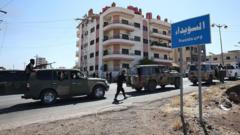Hamas has categorically rejected an Israeli ceasefire proposal that included disarmament of its armed forces, highlighting significant rifts amidst an ongoing and escalating conflict. As humanitarian conditions in Gaza worsen, concerns about civilian safety and infrastructure emerge.
Hamas Dismisses Israeli Ceasefire Proposal Demanding Disarmament, Escalating Conflict

Hamas Dismisses Israeli Ceasefire Proposal Demanding Disarmament, Escalating Conflict
Israel's ceasefire proposal faces rejection as Hamas insists on broader conditions for peace amid mounting humanitarian crisis.
Despite ongoing discussions mediated by Egypt, a senior Palestinian official disclosed that the Israeli proposal did not guarantee an end to hostilities or troop withdrawal from Gaza, critical points for Hamas. The situation remains tense as Israel intensifies its military operations in the region, resulting in tragic loss of life and dire humanitarian circumstances.
The humanitarian situation in Gaza has reached alarming levels, with escalating airstrikes leading to casualties. Amid continued military actions, the Israeli Defense Forces (IDF) reported targeting members of Hamas while casualties mount, including fatalities among medical staff. Recent statistics reveal over 1,600 people have died since resumed operations, bringing the total war casualties to an estimated 51,000.
Israel's strategy appears focused on pressuring Hamas through blockades and airstrikes, with the aim of securing the release of hostages. However, international criticisms of Israel's tactics grow, raising questions about humanitarian law violations and the impact on civilians. The conflict, now since October, sees Hamas asserting it will only release hostages in exchange for the end of Israeli aggression, further complicating the search for peace.
Israeli leadership faces domestic pressure as public support leans toward securing hostage releases over full military dismantlement of Hamas. However, opposition from hardline political factions creates a precarious balance in Israeli policymaking.
Moving forward, the increasing strain on Gaza's healthcare and living conditions, alongside renewed military actions, sets the stage for a volatile and uncertain path to peace within an already fragile region.
The humanitarian situation in Gaza has reached alarming levels, with escalating airstrikes leading to casualties. Amid continued military actions, the Israeli Defense Forces (IDF) reported targeting members of Hamas while casualties mount, including fatalities among medical staff. Recent statistics reveal over 1,600 people have died since resumed operations, bringing the total war casualties to an estimated 51,000.
Israel's strategy appears focused on pressuring Hamas through blockades and airstrikes, with the aim of securing the release of hostages. However, international criticisms of Israel's tactics grow, raising questions about humanitarian law violations and the impact on civilians. The conflict, now since October, sees Hamas asserting it will only release hostages in exchange for the end of Israeli aggression, further complicating the search for peace.
Israeli leadership faces domestic pressure as public support leans toward securing hostage releases over full military dismantlement of Hamas. However, opposition from hardline political factions creates a precarious balance in Israeli policymaking.
Moving forward, the increasing strain on Gaza's healthcare and living conditions, alongside renewed military actions, sets the stage for a volatile and uncertain path to peace within an already fragile region.



















